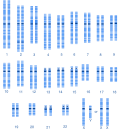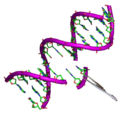Genetic recombination (also known as genetic reshuffling) is the exchange of genetic material between different organisms which leads to production of...
33 KB (3,958 words) - 07:51, 5 October 2024
In genetic algorithms and evolutionary computation, crossover, also called recombination, is a genetic operator used to combine the genetic information...
25 KB (2,269 words) - 16:26, 15 August 2024
(segregation) between two genetic markers, the further apart they are assumed to be. Conversely, the lower the frequency of recombination between the markers...
30 KB (3,953 words) - 20:23, 16 September 2024
Homologous recombination is a type of genetic recombination in which genetic information is exchanged between two similar or identical molecules of double-stranded...
106 KB (12,117 words) - 07:58, 5 October 2024
Crossover (genetic algorithm), also called recombination Genetic recombination, the process by which genetic material is broken and joined to other genetic material...
852 bytes (141 words) - 22:04, 28 March 2022
Chromosomal crossover (redirect from Crossing over, genetic)
results in recombinant chromosomes. It is one of the final phases of genetic recombination, which occurs in the pachytene stage of prophase I of meiosis during...
32 KB (3,709 words) - 22:10, 25 July 2024
recombination is a powerful tool and is used in transgenic animal modeling to link genotypes to phenotypes. The Cre-lox system is used as a genetic tool...
40 KB (5,058 words) - 07:42, 8 May 2024
multiple sources of genetic variation include mutation and genetic recombination. Mutations are the ultimate sources of genetic variation, but other...
29 KB (3,561 words) - 07:10, 5 July 2024
from those selected, through a combination of genetic operators: crossover (also called recombination), and mutation. For each new solution to be produced...
68 KB (8,044 words) - 01:32, 3 November 2024
Bacterial recombination is a type of genetic recombination in bacteria characterized by DNA transfer from one organism called donor to another organism...
12 KB (1,287 words) - 06:06, 28 October 2024
Mitotic recombination is a type of genetic recombination that may occur in somatic cells during their preparation for mitosis in both sexual and asexual...
12 KB (1,499 words) - 08:04, 5 October 2024
In genetics, Flp-FRT recombination is a site-directed recombination technology, increasingly used to manipulate an organism's DNA under controlled conditions...
21 KB (2,655 words) - 10:31, 15 May 2024
Site-specific recombination, also known as conservative site-specific recombination, is a type of genetic recombination in which DNA strand exchange takes...
20 KB (2,034 words) - 07:24, 28 October 2024
over one another and exchange genetic material. This random process of exchanging genetic material is known as recombination, and it is governed by its own...
9 KB (1,084 words) - 05:30, 23 May 2024
A genetic operator is an operator used in genetic algorithms to guide the algorithm towards a solution to a given problem. There are three main types...
7 KB (824 words) - 06:34, 5 September 2023
Somatic recombination, as opposed to the genetic recombination that occurs in meiosis, is an alteration of the DNA of a somatic cell that is inherited...
5 KB (563 words) - 15:07, 31 October 2024
from parents to offspring Genetic recombination, refers to the recombining of alleles resulting in a new molecule of DNA Genetic relationship (linguistics)...
819 bytes (143 words) - 01:35, 8 May 2024
generation. Genetic draft generates a different allele frequency spectrum to genetic drift. The Y chromosome does not undergo recombination, making it...
10 KB (1,276 words) - 04:41, 24 May 2024
Population genetics (redirect from Genetic migration)
dynamics, is its emphasis on such genetic phenomena as dominance, epistasis, the degree to which genetic recombination breaks linkage disequilibrium, and...
61 KB (6,983 words) - 22:00, 17 October 2024
Mosaic (genetics) (redirect from Genetic mosaic)
adjacent to inert regions. In the 1930s, Stern demonstrated that genetic recombination, normal in meiosis, can also take place in mitosis. When it does...
23 KB (2,639 words) - 10:06, 31 October 2024
Tetrad (meiosis) (section Genetic typification)
agar and the needle. Synthetic genetic array Saccharomyces cerevisiae Ascus Homologous recombination Genetic recombination Ascospore Perkins, D.D. (1962)...
5 KB (577 words) - 19:33, 17 April 2024
transcription. What differentiated this form of genetic recombination from those dependent of genetic homology was that the process observed as illegitimate...
8 KB (1,000 words) - 17:39, 3 December 2023
Genetic diversity is the total number of genetic characteristics in the genetic makeup of a species. It ranges widely, from the number of species to differences...
32 KB (3,739 words) - 03:26, 28 August 2024
Meiosis (section Genetic variation)
undergo genetic recombination, a programmed process in which DNA may be cut and then repaired, which allows them to exchange some of their genetic information...
64 KB (7,478 words) - 23:27, 22 August 2024
Genetic engineering, also called genetic modification or genetic manipulation, is the modification and manipulation of an organism's genes using technology...
134 KB (14,252 words) - 10:01, 5 November 2024
violated users' privacy. Allele Allele frequency Electropherogram Genetic recombination Haplotype Human mitochondrial DNA haplogroup Human mitochondrial...
60 KB (5,751 words) - 07:37, 2 November 2024
and subsequent crossing-over can result in genetic rearrangement. When non-allelic homologous recombination occurs between different LCRs, deletions or...
5 KB (528 words) - 20:22, 9 March 2024
invention of biolistics, Agrobacterium-mediated recombination and microinjection. The first genetically modified animal was a mouse created in 1974 by...
59 KB (6,419 words) - 05:18, 5 September 2024
biological cell that pair up (synapse) during meiosis Homologous recombination, genetic recombination in which nucleotide sequences are exchanged between molecules...
2 KB (309 words) - 18:42, 27 August 2023
Genetics (redirect from Genetic Science)
Genetics is the study of genes, genetic variation, and heredity in organisms. It is an important branch in biology because heredity is vital to organisms'...
98 KB (10,409 words) - 04:06, 29 September 2024













